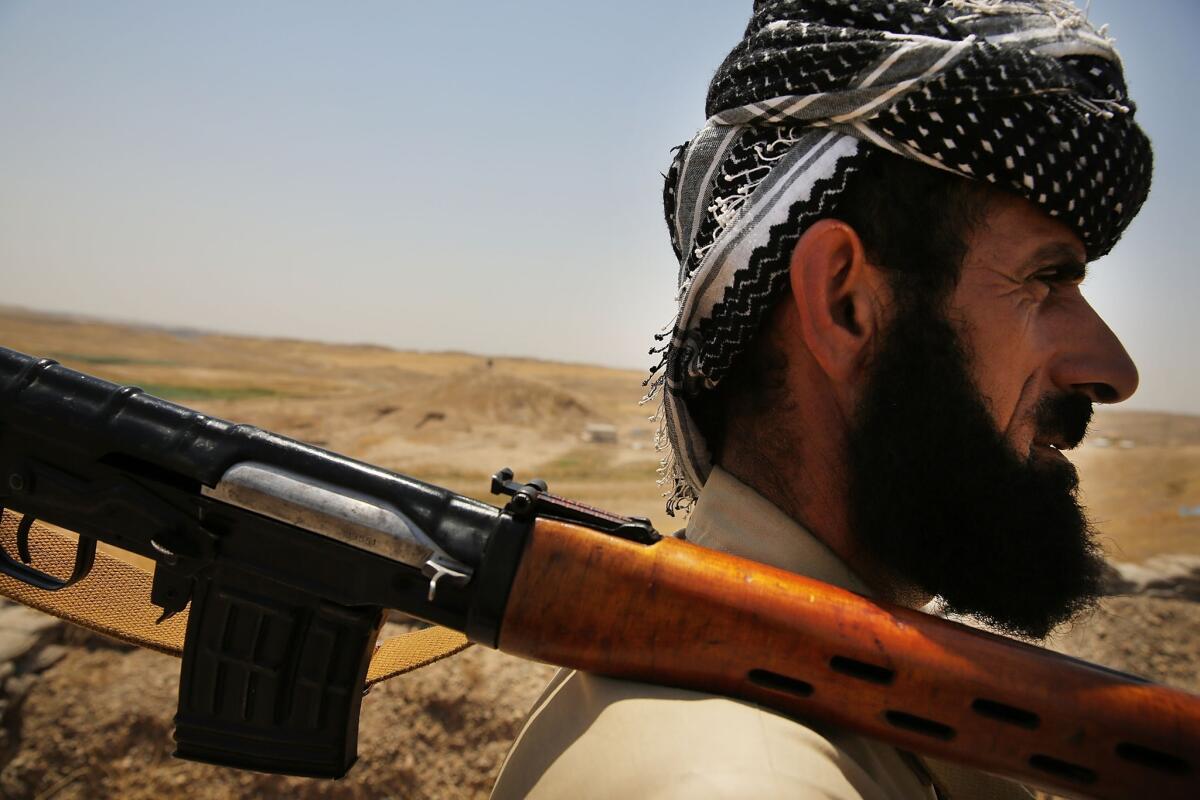Op-Ed: The Kurdish option: An independent state for the Kurds, an ally for the U.S. in Iraq

- Share via
“This moment requires statesmanship.” That was Secretary of State John F. Kerry — a man not known for irony — in a meeting in late June with Massoud Barzani, president of Iraq’s autonomous Kurdish region. Appealing to Barzani’s nonexistent Iraqi patriotism, Kerry asked for the Kurdistan leadership’s help in fighting Islamic militants overrunning northern Iraq, and pleaded for Kurds to help form a new government in Baghdad rather than seek independence.
But what Kerry seems to have meant is, “This moment requires provincialism,” because that is what the United States is asking the Kurds to remain: a province of Iraq. The Kurds aren’t likely to listen — Barzani announced a referendum on independence — and the question now is: How should the U.S. respond? Washington has long insisted on Iraq’s unity — “worship[ing] at the altar of a unified yet unnatural Iraqi state,” as foreign policy analyst Leslie Gelb has written. But recognizing Kurdish independence would advance American interests and better reflect American values.
The Kurds have powerful moral claims to statehood, claims denied after World War I, when a Kurdish state first proposed under Woodrow Wilson’s principle of self-determination was instead divided among Turkey, Syria and Iraq. Iraqi Kurds’ decades of suffering under Baghdad — including Saddam Hussein’s genocidal gassing campaign — give them grounds for exit now.
Still, despite calls over the years to recognize Kurdish claims, there have long been hard-nosed, geopolitical objections. But those concerns always rested on a brittle reading of realism and have now vanished.
First, there was fear of what Kurdish self-determination might do to regional stability. But with the neighborhood in meltdown, the neighbors are having second thoughts. Turkey long opposed independence, fearing radicalization of its large Kurdish population. Officially, Turkey still opposes independence, but its response has been complex and muted because Turkey has close ties with Kurdistan and sees it as a stabilizing hedge against Islamic militancy and Iraqi chaos.
Iran has its own Kurds but also an ambiguous attitude: It is likely to have considerable influence in an independent Kurdistan and is equally eager to stop the Sunni militants of the Islamic State, formerly known as the Islamic State of Iraq and Syria, who are threatening the Shiite-dominated government in Baghdad.
Then there was fear that independence would destabilize Iraq. Reading the news, that hardly seems like a compelling argument anymore. Of course, things could get worse. Some argue that partition would provoke even more bloodshed — quite a claim, since unified Iraq has set the bar pretty high. But while partitioning Arab Iraq might provoke a maelstrom, Kurdistan in effect has already separated from Baghdad.
Independence carries risks, but there are no options that don’t. Objecting to recognition because of the risk utterly ignores the very real and rising tide of bloodshed that our present policy of a unified Iraq entails. It is like objecting to the dangerous qualities of the only exit before one hurtles off a cliff.
But the most compelling argument is the realist one: Kurdish independence is happening and we don’t have good alternatives, so we might as well harness it to our interests. The U.S. wants the Islamic State defeated. But neither 300 military advisors nor drones nor bombing are going to turn the tide or hold the ground. The Kurdish militia, the peshmerga, is the only fighting force in Iraq able to resist and roll back the militants.
But the Kurds don’t have any incentive to carry the fight to the Islamic State — they have been beneficiaries of its success in Iraq, which has allowed them to consolidate their autonomy and seize oil-rich Kirkuk. If the U.S. wants the Kurds’ aid, we will need to give them something.
So what kind of deal is Washington offering? Help defeat the Islamic State and, in exchange, please forgo independence and join a new government for the dysfunctional country you want to escape. Not a particularly attractive offer.
Kurds see their moment for exit, and they are unwilling to commit lives and treasure to maintain an Iraqi state to which they feel only the heavy bonds of painful, past entanglements. Americans should understand that. And we have something the Kurds do very much want: recognition. So America should be telling the Kurds: If you help defeat the militants in the rest of Iraq, we will recognize your independence.
We shouldn’t take countries apart for pleasure, but neither should we insist on unity when states stop working for the people living in them. The Kurds have long since lost faith in Iraq and are rapidly consolidating their independence. We can resist that — scrambling to cobble together yet another dysfunctional coalition, concocting ever-more fragile federalisms — or accept the Kurds’ desire and align it with our interests and our values. The original promise of a Kurdish state, nearly a century ago, was an expression of America’s commitment to self-determination for peoples longing to be free.
Kerry asked the Kurds to be statesmen. Statesmanship is a quality we associate with states. The Kurds have long wanted one; perhaps now is the time. For that to happen requires statesmanship — from us.
Timothy William Waters is a professor of law and associate director of the Center for Constitutional Democracy at the Indiana University Maurer School of Law, and editor of “The Milosevic Trial — An Autopsy.”
More to Read
A cure for the common opinion
Get thought-provoking perspectives with our weekly newsletter.
You may occasionally receive promotional content from the Los Angeles Times.






